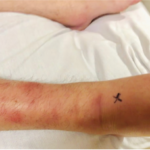Reactive arthritis is classically associated with an infectious etiology, such as Salmonella, Yersinia, Campylobacter, Chlamydia or gonorrhea. Clostridium difficile is a rare, and recently recognized, causative agent for this condition.1
Case Presentation
The patient is a 21-year-old man with a past medical history significant for hereditary spherocytosis and Crohn’s disease, complicated by an anorectal fistula, and was receiving monthly infusions of infliximab for his Crohn’s disease. He presented to the emergency department of an outside hospital with a five-day history of pain in multiple joints.
He was initially admitted to an outside hospital for concern of septic arthritis of the knees and was given empiric antibiotics, then transferred to our hospital for evaluation by a rheumatologist due to concerns for inflammatory bowel disease-related arthritis.
The patient initially developed left-sided rib pain, which was worsened by deep inspiration and improved with hot showers and stretching movements. He also noted left-sided hip and groin pain, bilateral wrist and hand pain, and knee pain associated with knee swelling, which significantly limited his range of motion. He denied any eye pain, eye redness, abdominal pain, tenesmus and hematochezia, but admitted to having diarrhea, which had not changed from prior to starting infliximab therapy. He denied rashes, mucosal ulcers, back pain, Raynaud’s phenomenon, dysuria or penile ulcers or discharge, recent insect bites or tick bites. His social history was unremarkable.
He was diagnosed with Crohn’s disease at the age of 16; his course was complicated by development of an anorectal fistula. He had been on and off steroids due to nonadherence. He was started on infliximab for persistent diarrhea. His last (fourth) dose was 10 days prior to his presentation. He stated that his chronic diarrhea had not changed from his baseline.
The patient’s initial vital signs showed low-grade fever and tachycardia. His physical examination was significant for painful passive movement of both wrists and the left hip, with limited flexion of the lower back, without swelling or tenderness of the knees.
His laboratory workup included a complete blood count, which showed mild elevation of his white blood cell count, normal comprehensive metabolic profile, erythrocyte sedimentation rate of 4 mm/hour, C-reactive protein of 89.2 mg/L initially, ferritin 97 ng/mL, negative hepatitis A, B and C screen, negative anti-nuclear antibodies, uric acid of 3.3 mg/dL, normal creatine phosphokinase and normal urinalysis. Rheumatoid factor was absent. Blood cultures and urine testing for gonorrhea and chlamydia were negative. Hip and sacroiliac joint X-rays were unremarkable.
Given his persistent diarrhea, a C. difficile stool polymerase chain reaction test was performed and yielded a positive result. His joint pain was, thus, attributed to reactive arthritis secondary to C. difficile infection; he was started on a course of oral vancomycin and was discharged home with resolution of his symptoms.
Discussion
Inflammatory bowel disease-related arthropathy is classified into two types: type 1 is related to disease activity, typically affecting fewer than five large joints. It is usually acute, self-limiting and responds well to inflammatory bowel disease-related treatment in most cases.
Type 2 is more chronic and remains for years; in some cases, it has been associated more with uveitis.2
Because our patient’s symptoms were relatively acute, his arthritis would more likely be classified as type 1; however, because he was on infliximab, we would expect the arthritis to be under control. It’s possible that infliximab was not enough to control his inflammatory bowel disease symptoms, and therefore, he had persistent diarrhea and inflammatory bowel disease arthropathy.
It’s important to consider other possible etiologies of the patient’s arthritis, including reactive arthritis. There are two major types of reactive arthritis, depending on the causative organism. The first type is related to post-enteric infections, classically described with Salmonella, Shigella, Campylobacter and Yersinia. The second type is associated with post-venereal infections, mostly Chlamydia trachomatis.3 Lately, C. difficile infection has been implicated as a less common causative organism.1
C. difficile infection is the most common gastrointestinal infection in patients with inflammatory bowel disease.4 According to recent literature, the prevalence of C. difficile infection has increased in the past decade, and it has been associated with worse prognosis and outcomes.5 In this patient, a diagnosis of C. difficile infection-associated reactive arthritis spared him unnecessary changes in his immunosuppressive treatment plan.
This case was challenging because the patient also had a history of complicated inflammatory bowel disease, raising a suspicion for possible inflammatory bowel disease-related arthritis. However, his condition was controlled, making that diagnosis less likely. Given the patient’s ongoing diarrhea while undergoing aggressive treatment with infliximab, his immunosuppressed state, elevated inflammatory markers, the elevation of his white blood cell counts and the evidence of C. difficile infection in the setting of large joint oligoarthritis in a young adult, reactive arthritis was a more likely diagnosis.6
Conclusion
We described a challenging case of a young man who was referred for consultation of possible newly developed inflammatory bowel disease-related arthritis. On evaluation, he was found to have reactive arthritis secondary to C. difficile infection, which is a rare but well-recognized causative agent for this condition.
This case highlights the importance of keeping an open mind and considering a broad range of possible diagnoses when evaluating rare and complicated conditions, integrating different elements of a patient’s historical information and current workup. Clinicians should maintain a high index of suspicion for rare manifestations of common etiologies.
 Hanan Ibrahim, MD, is a third-year, post-graduate, internal medicine resident at Henry Ford Hospital, Detroit. She plans to pursue a rheumatology fellowship.
Hanan Ibrahim, MD, is a third-year, post-graduate, internal medicine resident at Henry Ford Hospital, Detroit. She plans to pursue a rheumatology fellowship.
 Weixia Guo, MD, completed her residency at the University of Cincinnati and is a second-year, fellow in rheumatology at Henry Ford Hospital, Detroit.
Weixia Guo, MD, completed her residency at the University of Cincinnati and is a second-year, fellow in rheumatology at Henry Ford Hospital, Detroit.
 Ayad Alkhatib, MD, completed a residency at Henry Ford Health System in 2015 and a rheumatology fellowship at UT Southwestern Medical Center in 2017. He has been practicing rheumatology at Henry Ford Health System since 2017.
Ayad Alkhatib, MD, completed a residency at Henry Ford Health System in 2015 and a rheumatology fellowship at UT Southwestern Medical Center in 2017. He has been practicing rheumatology at Henry Ford Health System since 2017.
References
- Birnbaum J, Bartlett JG, Gelber AC. Clostridium difficile: an under-recognized cause of reactive arthritis? Clin Rheumatol. 2008 Feb;27(2):253.
- Vavricka SR, Schoepfer A, Scharl M, Lakatos PL, Navarini A, Rogler G. Extraintestinal manifestations of inflammatory bowel disease. Inflamm Bowel Dis. 2015;21(8):1982–1992.
- Carter JD. Treating reactive arthritis: insights for the clinician. Ther Adv Musculoskelet Dis. 2010;2(1):45–54.
- Micic D, Yarur A, Gonsalves A, et al. Risk factors for Clostridium difficile isolation in inflammatory bowel disease: a prospective study. Dig Dis Sci. 2018;63(4):1016–1024.
- Sinh P, Barrett TA, Yun L. Clostridium difficile infection and inflammatory bowel disease: a review. Gastroenterol Res Pract. 2011;2011:136064.
- Selmi C, Gershwin ME. Diagnosis and classification of reactive arthritis. Autoimmun Rev. 2014;13(4-5):546–549.


